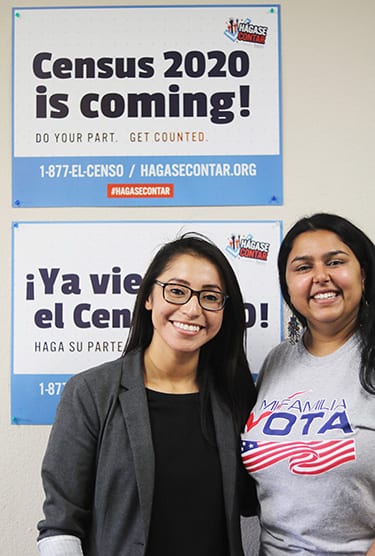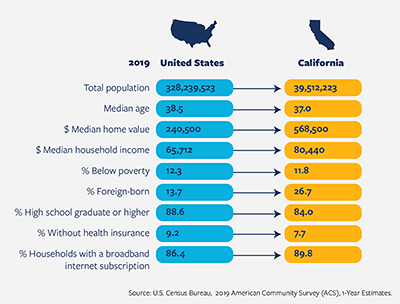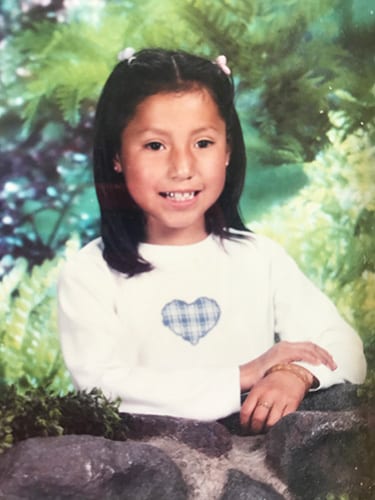By Andrew Cohen

Whether people view completing their 2020 U.S. Census as a civic obligation, a tool for equity, or a self-serving endeavor, Marlenee Blas Pedral ’23 offers some unifying advice: Just do it.
Conducted once a decade, the census guides how federal funding is allocated to the states and how political districts are drawn. With the COVID-19 pandemic and recent fires creating obstacles to a full count in California, Pedral sees participation before the October 31 deadline as paramount in protecting the state’s foundation.
“Our future is at stake,” she says. “Now more than ever we see funding for health and education — sectors severely impacted by the global health crisis — as two areas that heavily rely on adequate staffing and a fair share of financial support … This is the moment to participate to ensure that our families and our children can partake in the American dream.”
An immigrant and a first-generation college student, Pedral spent more than a year researching the local impact of the census and working to ensure full representation for hard-to-count community members as associate director of UC Riverside’s Center for Social Innovation. In that role she co-founded UC Counts!, helped establish a campus committee, and engaged faculty and staff in the program’s strategy.
Pedral helped gather data that assessed resources directed towards the center’s nonprofit partners, and created maps that exposed existing gaps. Overseeing an $18,000 grant to help reach hard-to-count student communities, Pedral co-developed marketing strategies and shared best practices with the California Complete Count office on how to motivate college students to fill out census forms during the pandemic.
She also crafted a strategy for Riverside’s year-long campaign, oversaw that implementation with six departments, convened campus ethnic and gender programs to engage them in a racial data project, and led various training sessions.

“I worked with almost 20 undergraduate and graduate researchers who gathered relevant data, conducted surveys, and provided analysis,” says Pedral, who also wrote op-eds and promoted the census to Riverside County’s Spanish-speaking community on the radio. “That helped inform our nonprofit partners and helped the region allocate funding where it was most needed.”
Helping California help itself
As of mid-August, fewer than 65 percent of California households had completed the census. The pandemic has also curtailed the ability of census workers to follow up by going door-to-door to count those who have not responded.
Among the risks of an incomplete count: California could lose seats in Congress and billions of dollars in federal aid. Toward that end, Pedral’s efforts include debunking myths to increase responses.
“One big misconception is that the census excludes immigrants,” Pedral says. “Media did a great job at alerting immigrant communities of the Trump administration’s attempt to add a citizenship question to the census, but didn’t do a great job to ease this alarming concern. It’s important to share with immigrant communities that the 2020 census does not have a citizenship question and that we all count.
“A second misconception is that data isn’t safe. The truth is that our census responses are protected by law and will not be shared with any other entity. The data collected is important and the intelligence, statistics, and general information captured in the 2020 census is the gold standard for the next 10 years. If we want to have reliable data, we need to be sure to fill out the census.”

Born in an autonomous Otomi indigenous community north of Mexico City, Pedral was 8 when her family came to the U.S. Initially undocumented, her parents eventually began the painstaking legalization process and “against all odds” Pedral became a U.S. citizen during her sophomore year at UC Santa Barbara.
A staunch advocate for programs that fuel equal access and higher education opportunities, she later earned a master’s degree in higher education at the University of Vermont and did a Fulbright Fellowship in Brazil.
Working at UC Riverside, her insights working on census initiatives and her gratitude for counselors who supported her as a first-generation college student prompted Pedral to co-found the school’s Butterfly Project. A scholarship, professional development, and mentorship program — the first of its kind in the UC system — it serves undergrads with a demonstrated commitment to and an understanding of the undocumented community.
“We spent countlesss hours doing research, interviewing other UC campuses on how they supported undocumented students, securing funding, developing curriculum, and establishing trusted campus partners to become mentors and internship sites,” Pedral says. “It’s been one of the most rewarding experiences I’ve had.”
Eager to expand her capacity to effect change and help disenfranchised students, she quickly found herself pursuing law school.
“Berkeley Law’s scholarship, leadership, and welcoming community assured me that this was the perfect place for me,” she says. “I want to be at the table to defend what my parents sacrificed their lives for: access to quality education. My goal is to serve as legal counsel for a university to ensure that students see an attorney who looks like them and understands their quest to attend college, all while creating an equitable education system.”